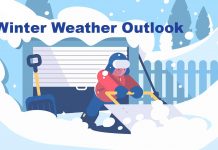TORONTO – WEATHER – The City of Toronto has enacted the city’s comprehensive snow plan in preparation for a winter storm expected in the city for Tuesday.
Environment Canada has issued a special weather statement for a winter storm tomorrow with the possibility of 15 to 20 cm of snow, as well as ice pellets, freezing rain and strong winds.
The City of Toronto has a comprehensive snow and ice response plan that prioritizes the safety and movement of residents. Toronto is a vibrant city with more than 5,600 kilometres of roads and 2.9 million people.
Proactive measures taken before the storm include:
• monitoring road temperature using sensors on salt trucks and pickup trucks
• co-ordinating more frequent access to weather forecasting and meteorologists
• activating nine road weather information system stations, including two new stations in East York and one in the York-Yonge-Bay ramp, and
• preparing for winter by maintaining roads, performing on-going pothole repair blitzes, replenishing salt and de-icer supplies, attending training and seeking new ways to address snow.
During the storm, winter operations include:
• de-icing, salting, plowing and snow removal as required
• daily staff conference calls coordinate snow clearing efforts
• GPS on plows power the PlowTO web app at https://www.Toronto.ca/plowTO
• a fixed automated spray technology de-icing system on the York-Bay-Yonge ramp to help keep emergency vehicles and commuters safe
• access to salt additives like beet juice that melt ice faster when temperatures are frigid, and
• real-time cameras to see actual conditions on key streets to inform operations.
After the storm:
• Crews work around-the-clock to clean-up the remaining snow and ice on city streets, sidewalks, bike trails, laneways, and more.
• Staff respond to resident requests through 311.
• Staff continue to coordinate cleanup efforts via conference calls.
• Services delivered are reviewed to inform future improvements.
Service Levels
The following are the City’s winter operation service levels:
• Anti-Icing – Salt brine is applied to expressways, hills and bridges up to 24 hours before snow falls.
• Salting – When the snow begins to stick, expressways, major and local roads are salted and must be completed on all serviced roads between one and 24 hours from the end of snowfall.
• Plowing – Expressways are plowed first at 2 cm of snow accumulation (within two to three hours). Major roads are plowed at 5 cm of accumulation (within six to eight hours). Collector roads are plowed between 5 and 8 cm of accumulation (within 14 to 16 hours). Local road plowing starts when accumulation has reached 8 cm and the snow has substantially stopped falling.
• Windrow opening – For areas where it is mechanically feasible (not in the central core), driveway entrances are cleared to an opening of three metres within two hours following the end of road plowing.
• Sidewalk and transit stop clearing – High pedestrian volume areas are cleared first, starting after 2 cm of accumulation. After the snow has stopped falling, sidewalks can take six to seven hours to be cleared and transit stops can take up to 48 hours to be cleared.
• Cycling routes – Salting begins on cycling routes at the same time as salting on the adjacent road. Plowing is completed after 5 cm of accumulation.
• Seniors and persons with disabilities – In areas of the city where mechanical sidewalk snow clearing is not feasible the City offers a free snow-shovelling service for those in need.
Business and property owners are responsible for ensuring that all ice and snow are cleared from sidewalks, driveways, parking spaces, steps, ramps and landings within 24 hours of snowfall to provide safe access for people and vehicles. The City will clear snow from sidewalks within 12 hours of snowfall, where it is possible to safely drive a plow. Property owners who fail to clear their snow and ice could be subject to a fine. More information is available at https://www.toronto.ca/services-payments/streets-parking-transportation/road-maintenance/winter-maintenance/clearing-snow-and-ice-from-your-property/.
Autos that block streetcar tracks or impede emergency vehicles will be tagged and towed at the owner’s expense. Blocking streetcar tracks can inconvenience thousands of commuters and put at risk the safety of others in an emergency.
Emergency preparedness
The combination of snow, ice pellets, freezing rain and strong winds may create hazardous conditions and cause power disruptions. Residents and businesses are encouraged to take precautionary steps to protect their property and ensure their safety. During severe weather, the public are reminded to:
• Try to keep children and pets indoors.
• Stay away from rivers and streams and from downed wires and trees that may have an electrical charge.
• Take public transport and avoid driving if possible. If it is necessary to drive, do so cautiously and slowly. Keep the vehicle’s gas tank at least half full at all times.
• Offer to help elderly neighbours or those individuals who may need assistance.
• Pick up critical medications before the storm.
More information about emergency preparedness, including how to pack an emergency kit and go bag, is available at https://www.toronto.ca/community-people/public-safety-alerts/emergency-preparedness/.
Assistance for vulnerable people
The City asks that residents help vulnerable people by calling 311 if there is a need for street outreach assistance, 911 if the situation is an emergency.
The declaration of an Extreme Cold Weather Alert activates additional City services that focus on getting and keeping vulnerable residents inside. A warming centre is opened at Metro Hall by 7 p.m. the day an alert is called and remains open continuously until noon on the day an alert is terminated. Pets are welcome. Service restrictions at shelters are also relaxed and additional overnight street outreach teams are deployed.
More information about 24-hour respite sites, shelters, housing help, drop-ins and Out of the Cold programs is available at http://toronto.ca/homelesshelp.
Basement flooding and frozen pipes
With possible rain and snow accumulation, residents are encouraged to do the following to prevent basement flooding:
• Shovel the snow and ice away from the foundation and onto a lawn, not the road.
• Ensure eavestroughs and downspouts are clear of snow, ice and other debris and are working properly.
• If it is safe to do so, clear debris from roadside catch basins to help melting snow and rain enter the storm sewer.
During cold winter weather, water pipes can freeze. Property owners are encouraged to take steps to protect pipes from freezing and learn what to do if they freeze, at http://www.toronto.ca/frozenpipes.
Power outages
Power outages can be reported to Toronto Hydro at 416-542-8000. Toronto Hydro will work to restore power as quickly as possible.
During an outage, residents are reminded to follow these safety precautions:
• Unplug or turn off all appliances to avoid possible damage when power resumes.
• Don’t use barbecues, propane heaters or portable generators indoors or in enclosed spaces such as garages, covered porches and sheds – they generate carbon monoxide gas, which can be fatal.
• Never leave candles unattended. Use a flashlight instead.
• If electricity is restored to your area, but your home still does not have power, call Toronto Hydro at 416-542-800 (press 1) to speak with a dispatcher.
• Plug in only the most essential appliances first, and wait 10 to 15 minutes to give the electrical system time to stabilize before connecting other items.
After power is restored, the public should limit electricity use to help relieve potential strain on the system by these measures:
• Turn off all non-essential internal and external lights.
• Limit the use of major power-consuming equipment such as dishwashers, washers and dryers.
Contacting the City and other agencies
Residents are reminded that 911 is for emergencies only, including downed power lines. For all other incidents where police are required, call 416-808-2222.
Residents are asked not to call 311 to ask when their street will be plowed. Local roads are plowed 14 to 16 hours after a snowfall is over. To watch plows working in real time visit http://www.toronto.ca/plowTO.
Staff are available at 311 Toronto, 24 hours a day, seven days a week, to respond to City-related inquiries and service requests, including non-working traffic signals, other road and sidewalk problems, as well as damaged trees on City property. To contact 311 Toronto Dial 3-1-1, email 311@toronto.ca or visit http://www.toronto.ca/311.
For damaged trees on private property, residents should contact a private tree service company.
For updates during an emergency event and other City information, follow @cityoftoronto on Twitter. For updates on winter operations follow @TO_WinterOps on Twitter.






